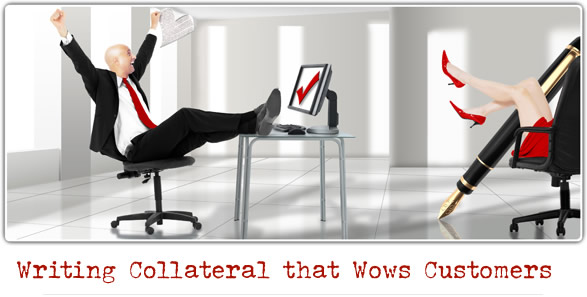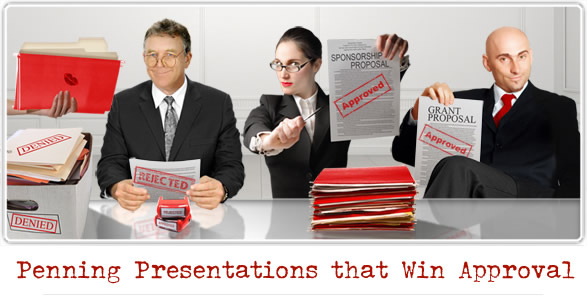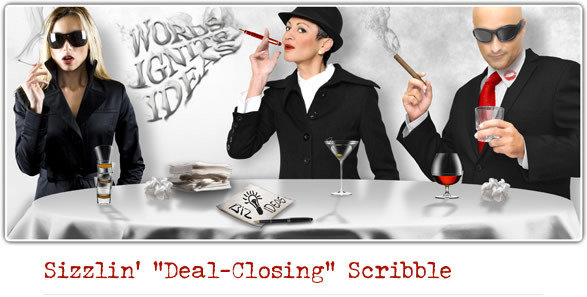
Click Thumbnails To Jump To Advisory

Gettin' a Leg Up on the Competition
Writing Collateral that Wows Customers

Persuasive Proposals
Penning Presentations that Win Approval

Smokin' Hot Lingo
Sizzlin' Deal-Closing Scribble

Gettin' a "Leg Up" on the Competition

Whether it's advertisements, articles, blog columns, company newsletters, email promotions, press releases, product packaging, radio spots, speeches, video-scripts, Twitters, sponsorship proposals or web-sites — it always starts with magnetic written content.
The words that you choose, and the manner in which you present them, have the same impact on your customers as physical body language. So make sure you’re selecting the right words. Written content must court the appropriate audience sexy for a record label; serious for a bank; stimulating for direct mail pieces to entice customers to action. Readers must be roused in seconds in order to react.
Any successful document depends on thorough knowledge of the subject being written about, and an understanding of the customary format and protocol for that document. A press kit that’s distributed to a newspaper or magazine is structured differently than a press kit directed to a television station. A proposal seeking sponsorship is different from a proposal seeking an investment.
Effective written content should dance with vivacious verbs and audacious adjectives to produce potent sentences that win-over the target audience. Words are the “tease” that draws, secures and keeps customers.
In today’s business courtship, the majority of conquests are online. And the rules-of-engagement aren’t what they used to be when wooing customers that you may never meet face-face. To maintain relationships with the customer you’ve got to “kick up your heels” and command attention to stand out among the billions of digital messengers out there. In business as in romance, the potent pen is an unrivaled tool of seduction.
The true test of a document’s “woo-power” is favorable response from customers. Sales will soar when your written outreach is on-target.
HOW-TO-WOO

ADVISOR

Charles Marsh, Ph.D.
William Allen White
Foundation Professor
Associate Professor
School of Journalism and Mass Communications
University of Kansas

“Whoever your audience is, consider its members before you write. Good writing begins with intense focus on the receiver's wants and needs. Our successes and failures often stem from our ability — or inability — to communicate with one another. Whatever the document may be — a speech, an annual report, or even an in-house memo — its aim is consistent: to be an effective tactic in the management of relationships vital to an organization’s success.”


Persuasive Proposals

If you are hoping to secure a grant or sponsorship, including nailing funding for major multi-million dollar initiatives, a strong written proposal is the key to impressing financiers.
In preparing to woo endorsement of projects as diverse as airline sponsorship for a travel column to funding for a new hospital wing, a writer can invest months calculatingly structuring the proposal, and identifying a “hit list” of funding sources to target.
Most providers of sponsorship, grants, contracts, or funds agree that “progressive executions” that stand out from the pack end up in the slim “Approved” pile, while the majority of proposals land in the massive “Rejection” stack.
Penning a winning proposal is more than just a matter of coming up with an idea and stating a need. Research, writing, editing and design must all work together to create a brand-appropriate document that identifies a “win-win” for both the recipient and the donor.
Securing a grant or sponsorship is not just about the guy who has his hand held out in need. For a proposal to make it past the “gatekeepers” in any organization, it must possess surface “schmooze appeal” and interior “guts.” I’ve found that the tried-and-true KISS principle (Keep It Simple Sweetheart) applies when constructing most proposals. Simplicity doesn’t always imply short in length, but a concept that’s straightforward and clear, not drawn-out and complex.
A strong written proposal generally requires a short courtship. When I won sponsorship from Gateway Computers for a syndicated column back in 1996, the call with a “yes” came in a record-breaking two weeks. There were no face-to-face meetings over tea and crumpets, and no getting-to-know-you rendezvous with the powers that be. The proposal made a good impression inside and out, and the committee granted swift head-over-heels approval!
HOW-TO-WOO

ADVISOR

Gail S. Bower
President, Bower & Co. Consulting LLC
Author, How to Jump-start Your
Sponsorship Strategy in Tough Times

"Potential corporate sponsors sometimes spend as few as 5 seconds scanning piles of partnership offers. If you don’t woo them in seconds, you’re out. Your job is to describe the value you have to offer in a way that aligns with that corporation's priorities and to show that your sponsorship opportunity will deliver a measurable return on investment. You need writing that pops off the page and gets that sponsor's attention."


Smokin' Hot Lingo

We’ve all heard about the proverbial business plan scribbled on a napkin that wooed millions of bucks in venture capital. And while most mega-deals aren’t sealed with simply a stroke of a Mont Blanc in a smoky jazz lounge, while the sumptuous tunes of Diana Krall float in the background, it is true that words ignite ideas and are the spark behind effective marketing collateral.
All creative blueprints thrive on words – brochures, posters, proposals, flyers, newsletters, web content, radio spots and, yes, business plans.
In many ways, doing business in the “lounge-setting” is fashionable again. Though it’s not the smoke-hazed jazz lounge from decades past, “deal-closing” lingo is ablaze in the more relaxed casual setting of the “social media lounge” – the chat rooms, the tweet parlor, the standing-room-only Facebook alley plastered with wall graffiti. The tweets, blogs and social media scribblings of today are much like the brevity and bravado of words scrawled across a napkin.
Whether it’s words for the social-stratosphere or traditional media, sizzlin’ hot “deal-closing” communiqués are those that linger in your psyche like the stench of a pungent cigar lingers in your clothing.
The appropriateness of words for “the setting” – from the social media lounge to the boardroom – can determine whether or not you seal the deal.
HOW-TO-WOO

ADVISOR

C. Sunny Martin
Author, Publisher
C. Sunny Martin & Associates

"As a multicultural marketing expert who has published over 59 corporate-sponsored directories in 26 cities, I know firsthand that it's the power of words that closes business deals. Everyone from Presidents Bush and Obama to famed actors and astronauts has penned forewords to my directories. Whether the first point of contact is a formal letter or a few words written on the back of a business card at a casual party, you’ve got to know how to precision your outreach to fit the occasion."


